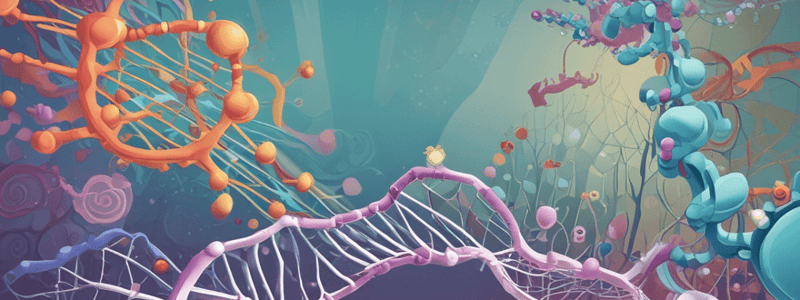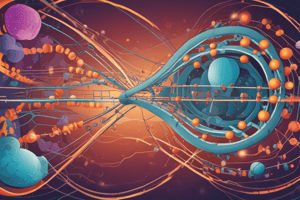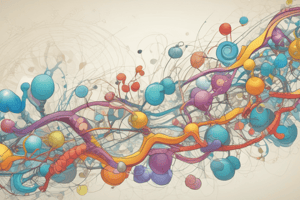Podcast
Questions and Answers
Where do antibiotics target during bacterial protein synthesis?
Where do antibiotics target during bacterial protein synthesis?
- DNA replication sites
- mRNA sites
- tRNA sites
- Ribosome sites (correct)
What macromolecular assembly is involved in protein synthesis?
What macromolecular assembly is involved in protein synthesis?
- Nucleus
- Golgi apparatus
- Mitochondria
- Ribosome (correct)
According to Crick's adaptor hypothesis, what carries the amino acid to the template?
According to Crick's adaptor hypothesis, what carries the amino acid to the template?
- mRNA
- Aminoacyl tRNA synthetase
- rRNA
- Adaptor (correct)
Which nucleotide pair is important for the alignment of mRNA and tRNA?
Which nucleotide pair is important for the alignment of mRNA and tRNA?
Which of the following amino acids only have a single codon?
Which of the following amino acids only have a single codon?
How is the genetic code described?
How is the genetic code described?
How many of the 64 possible triplets specify amino acids?
How many of the 64 possible triplets specify amino acids?
What does the alignment of two RNA segments result in?
What does the alignment of two RNA segments result in?
Flashcards are hidden until you start studying
Study Notes
Protein Synthesis
- Occurs in a large macromolecular assembly called the ribosome, composed of many proteins and several RNA molecules
- Involves tRNAs that interact with mRNA and are charged with one of the 20 common amino acids by 20 different aminoacyl tRNA synthetases
- Requires a dozen or more additional protein factors for initiation, elongation, and termination of translation
- Involves perhaps 100 additional enzymes that carry out a variety of modifications with many proteins
Crick's Adaptor Hypothesis
- Proposed by Francis Crick in the early 1950s, recognizing that protein sequence is encoded by the nucleotide sequence
- Suggests that the template is RNA (maybe rRNA), and the amino acid is carried to the template by an adaptor
- Adaptors may contain nucleotides
Properties of the Genetic Code
- Composed of nucleotide triplets (three nucleotides)
- Non-overlapping, meaning each nucleotide is part of only one codon
- Comma-free, meaning there are no punctuation marks
- Ordered, meaning similar amino acids are specified by related codons
- Contains start and stop signals
- Nearly universal, meaning the same code is used in all organisms
- Degenerate, meaning there is redundancy but no ambiguity
Codons
- Written in the 3' → 5' direction
- The 3nt base is less important
- Only Met and Trp have a single codon
- Some codons are better than others because of the abundance of such tRNAs
mRNA Codons and tRNA Anticodons
- The codon sequence is complementary with the anticodon sequence
- The codon in mRNA base pairs with the anticodon in tRNA via hydrogen bonding
- The alignment of two RNA segments is antiparallel
The Genetic Code
- A non-overlapping code, with each amino acid, plus polypeptide initiation and termination, specified by RNA codons, composed of three nucleotides
- Each of the 20 amino acids in proteins is specified by one or more nucleotide triplets in mRNA
- Of the 64 possible triplets, 61 specify amino acids and 3 signal chain termination
- The code is non-overlapping, with each nucleotide part of a single codon
Studying That Suits You
Use AI to generate personalized quizzes and flashcards to suit your learning preferences.




